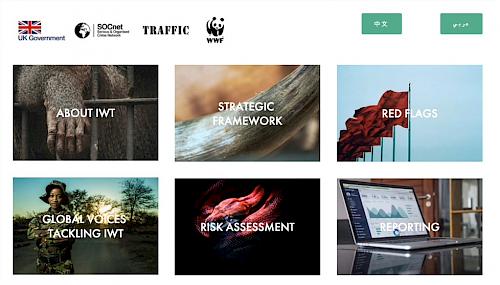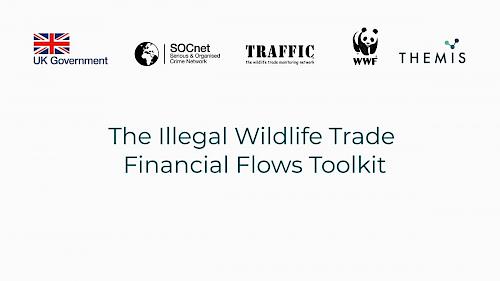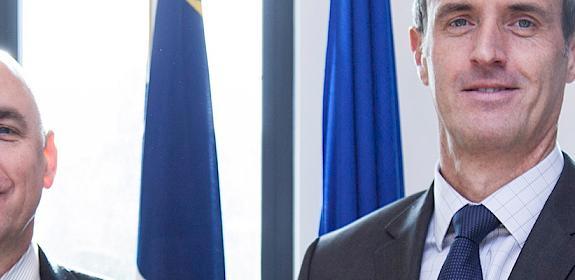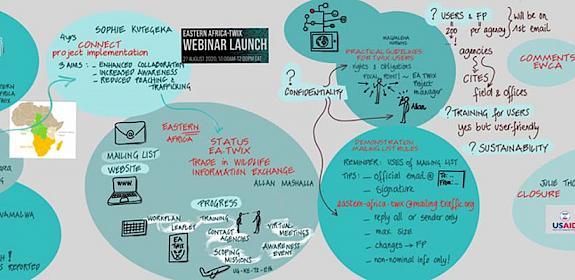Financial Flows Toolkit to tackle Illegal Wildlife Trade
UK and UAE governments launch new toolkit to support financial institutions in tackling illicit money flows associated with illegal wildlife trade at Expo Dubai on 3rd March to coincide with UN World Wildlife Day.

- UK Minister Lord Tariq Ahmad of Wimbledon in collaboration with His Excellency Ahmed Ali Al Sayegh launched a practical and freely accessible IWT Financial Flows Toolkit aimed at supporting governments and financial institutions to raise awareness of IWT and help them identify and mitigate suspicious transactions associated with illegal wildlife trade.
- The toolkit builds on the landmark UK-UAE Partnership agreement to tackle illicit financial flows, formed in September 2021.
- Financial sector can play a pivotal in fighting this crime. Through public-private partnerships and international co-operation, we can establish strong foundations of information sharing to detect and address illicit money flows that have a detrimental impact on our economies and environment.
Illegal wildlife trade (IWT) is the 4th-largest organised crime after drugs, people and counterfeiting, costing $23bn annually. Financial crime is at the heart of it. Wildlife trafficking is not only extinguishing species and destabilising ecosystems, it’s also fuelling corruption and undermining livelihoods in our communities. According to the World Wildlife Fund (WWF), the numbers are horrific: around 20,000 African elephants are killed by poachers each year; and rhino poaching has soared since 2007 with an average death rate of around 100 rhinos per month. Data from TRAFFIC confirms that at least 23.5 tonnes of pangolins and their parts were trafficked in 2021 alone.
We are witnessing dramatic losses in species globally because of this for-profit crime, so effective strategies to address this require the financial underbelly to be targeted and disrupted. This toolkit will enable financial institutions and governments with the information they need to target and tackle illicit money flows associated with wildlife trafficking; making it harder for criminal syndicates to continue this detrimental practice.”
Nick Ahlers, TRAFFIC’s Africa Programme Director

Watch the video
IWT knows no borders – and criminal networks continue to exploit vulnerabilities in our systems using a low-risk high-profit model. Financial sector can play a pivotal in fighting this crime. Through public-private partnerships, information sharing and international co-operation, can establish strong foundations to detect and address illicit money flows that have a detrimental impact on economies and environment.
UK Minister Lord Tariq Ahmad of Wimbledon in collaboration with His Excellency Ahmed Ali Al Sayegh launched a practical and freely accessible IWT Financial Flows Toolkit aimed at supporting governments and financial institutions to raise awareness of IWT and help them identify and mitigate suspicious transactions associated with illegal wildlife trade.
The Toolkit builds on the landmark UK-UAE Partnership agreement to tackle illicit financial flows, formed in September 2021. Minister Al Sayegh added that “Illegal Wildlife Trade forms an intrinsically important aspect of illicit financial flows. The partnership between the private and public sectors is key towards mitigating and addressing this global issue. This is why I am pleased that members of the UAE’s Public Private Partnership Subcommittee who will endorse the IWT toolkit, which will mark a new step towards combatting Illegal Wildlife Trade.”
Jennifer Croes, Associate Director at Emirates Nature-WWF said: "Wildlife crime takes advantage of vulnerabilities in the supply chain, enabled by corruption, fraud, and inadequate regulation, converging with other forms of serious criminality such as money laundering and cybercrime. Financial institutions play a key role in monitoring and investigating suspicious activities, and to disrupt the trade chain holistically, we need to ‘Follow the Money’, that fuels and finances the trade. It is critical to work together with entities across the sectors to detect, investigate and disrupt illicit financial flows related to wildlife trafficking by utilizing red flags and risk assessment indicators. The free, accessible and practical IWT Financial Flows Toolkit, also translated into Arabic, showcases UAE’s commitment in tackling this issue and putting an end to illegal wildlife trade."
UK Serious Organised Crime Network in collaboration with UAE government, WWF, TRAFFIC and Themis and with extensive contributions from various sectors, developed the Toolkit, focussed on the Africa to Asia route – including global financial centres, in particular the UAE, Hong Kong and Singapore.
Tools like this provide essential guidance to financial institutions and government agencies in China on necessary governance and stewardship to drive best practice in tackling the illegal trade of wildlife. TRAFFIC will join hands with ACAMS China and other partners to promote the use of this toolkit by delivery of training and webinars, filling gaps in understanding financial flows and support measures to mitigate the risks of wildlife crime and associated money launder-laundering and addressing an associated lack of familiarity and low historic prioritisation of money laundering threats association with wildlife crime.”
Ling Xu, China Office Director at TRAFFIC
The Toolkit addresses the nexus where IWT converges with serious organised crime, and to reach a broader spectrum of stakeholders, has been translated into Arabic and Mandarin by the UAE government and TRAFFIC’s China office.
Toolkit highlights the critical importance of collaboration in addressing this crime: neither law enforcement, nor government, nor the private sector can tackle it alone; and public-private partnerships are key to success.
Notes:
The Chinese translation of the toolkit was generously funded by NORAD and U.S. Department of State-funded INL project (Money laundering and the illegal wildlife trade in China).




